TLDR
In this smart contracts for beginner’s guide, we’ll cover:
- Introduction: Smart contracts provide a secure way to facilitate self-governing agreements between two parties without intermediaries.
- Benefits: They ensure robust security and complete trust in transactions, reducing time and cost without sacrificing quality.
- Challenges: Integrating within existing legal frameworks, potential coding errors, and anonymity concerns.
As blockchain tech adoption grows and trust in smart contracts strengthens, we believe they will replace most traditional contracts.
Introduction
Smart contracts are the future contracts; according to blockchain enthusiasts, they will replace information exchange and agreements as we know them today.
This guide will give you a comprehensive and easy-to-understand overview of how smart contracts are structured.
We’ll explore how the technology works, where you can use smart contracts, the benefits and disadvantages of writing smart contracts, and the future of these digital agreement programs.
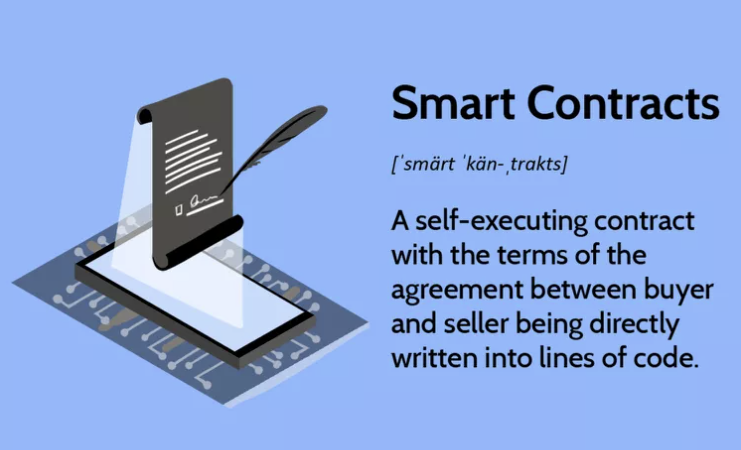
What are smart contracts?
Let’s start by reviewing the beginning of smart contracts and how the functionality looks in practice.
Nick Szabo, Ethereum, and the Beginning of Smart Contracts.
Nick Szabo came up with the first known definition of a smart contract in 1996. He argued that contracts, agreements between two or more parties, were one of the most solid components of a well-functioning democratic society.
Szabo also pointed out that maintaining this tradition would become increasingly challenging as the digital age became a reality.

Therefore, Szabo proposed a digital solution to a digital problem: a continuation of smart contracts applications that would still work in the era of information technology. He specified smart contracts (‘smart’ because Szabo considered them a lot smarter than paper contracts) as follows:
A smart contract is a set of promises, specified in digital format, that includes protocols in which parties act according to these promises.
Nick Szabo
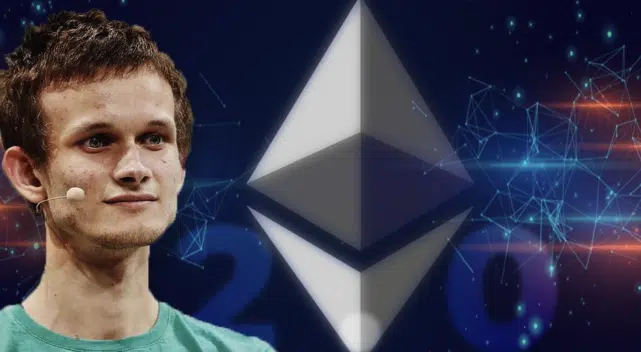
Fast forward 20 years. Writing about smart contracts without mentioning Vitalik Buterin and the blockchain project Ethereum is impossible.
Buterin merged Szabo’s smart contract idea from the 90s with the groundbreaking blockchain technology launched by Satoshi Nakamoto six years earlier. And thus, smart contracts supported by the blockchain were born.
Until then, the blockchain had been limited to direct financial transactions between individuals. But with a smart contract, taking advantage of the decentralized network for any transaction became possible.
In the Ethereum network, smart contracts are primarily used to run decentralized applications. However, the principle can be applied to any transaction that requires predetermined frameworks.
Step by step: How to run a smart contract.
So, how does a smart contract work? Smart contracts are based on “if this, then that” logic.
To put it as simply as possible, you can express the principle in programming language as: ‘If A, then B.’ In this case, you program predetermined conditions into a contract or program, which executes automatically and runs sequentially.
Nick Szabo compared this logic to a vending machine at the time.
The sequence goes as follows:
- You put money in the machine
- You choose the soda you want
- The machine checks if you have paid enough money for the soda
- The machine gives you the soda
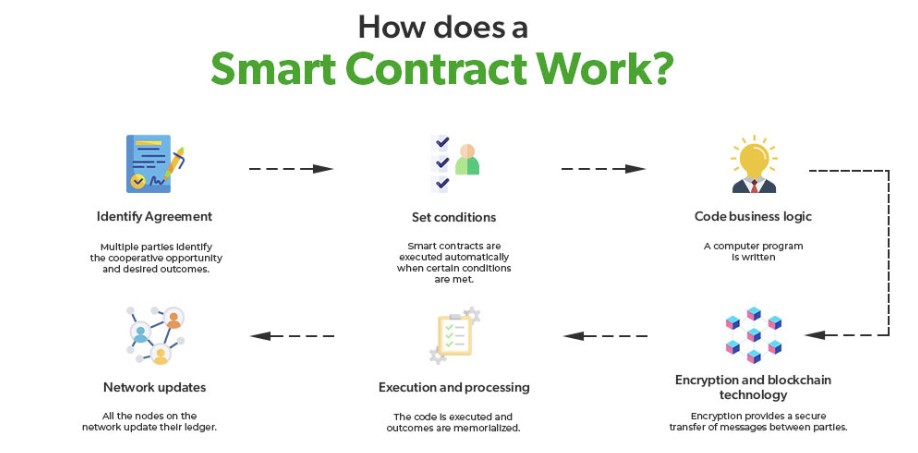
None of these steps in the supply chain would have occurred without each other, and they wouldn’t have occurred differently. “If A, then B”; you have to put money in (A) for the machine to give you your drink (B). A smart contract brings this principle into the digital world and programs in the predetermined sequence.
Let’s say you want a smart contract for rent payments in your apartment. In practice, this contract will work exactly like a traditional contract, except that the digitalized version ensures that both parties must agree.
- You link your bank account to a shared payment solution.
- The tenant links their bank account to the shared payment solution.
- The payment solution is recorded in the smart contract.
- The date of rent payment and the monthly rent amount are also recorded.
- The smart contract automatically withdraws money from the tenant’s account. It transfers to your account on the pre-programmed date and for the pre-programmed amount.
Thus, one becomes less dependent on trust with a smart contract because more of the contract is digital and automated. Additionally, the blockchain network can deploy smart contracts as computer code against a public transaction ledger, ensuring that both parties comply with the contract.
Blockchain network and confirmation of smart contracts.
A blockchain is essentially a decentralized network that operates a public transaction ledger. Initially, people used the ledger to create smart contracts and track cryptocurrency transactions. You can use smart contracts to track any transaction involving money or information.
When you combine blockchain with smart contracts, you obtain a public overview of the pre-programmed sequence of contracts.
Continuing with the previous example above, if the tenant believed they had already paid the rent despite you not receiving the funds. The sequence information is publicly available with a smart contract on the blockchain.
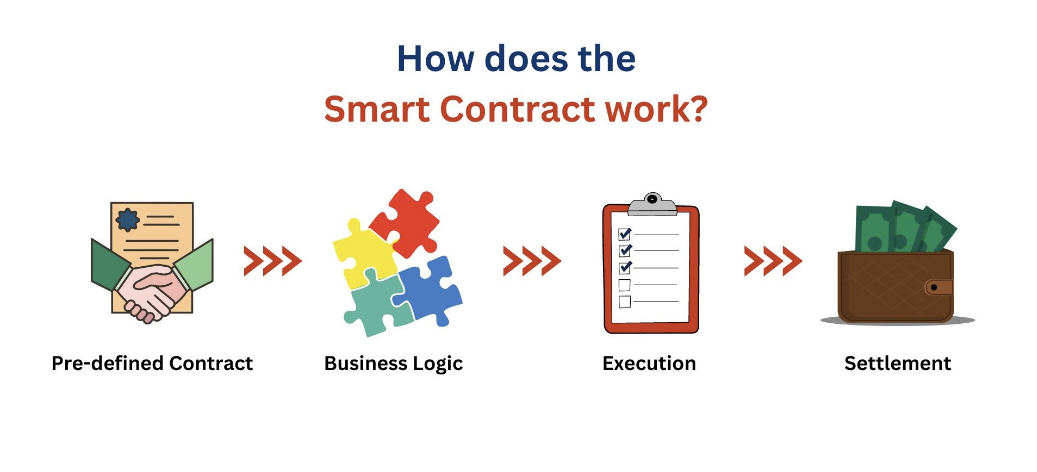
In other words, anyone can check what is true. As soon as the money is transferred from the tenant, it will be permanently stored in the wallet address in the public transaction ledger. Thus, it becomes easy to maintain complex smart contracts when programmed with this, then that business logic is on top of a public and decentralized blockchain.
In these cases, the decentralized network also confirms all transactions. A specific number of active nodes (users) on the network must confirm a rent payment to proceed and be recorded in the ledger. This leads to security and direct transactions between the two parties without needing a third party, such as a bank or broker.
Trusted Partners
What can smart contracts be used for in practice?
You can use smart contracts for any transaction involving the exchange of information or values that require trust in the sequence. These contracts demonstrate that blockchain networks extend beyond just monetary transactions.
Smart Contracts as a Voting System
Preventing corruption and fraud in political elections is a huge challenge, especially in developing countries. The problem until now has been the lack of reasonable, digital solutions that can replace the old paper votes. Unfortunately, this type of voting is cumbersome and slow and probably leads many people not to vote.
Smart contracts for beginners can introduce secure, tamper-proof, and decentralized voting systems to mitigate the challenges of digital voting, including hacking. With proper identity verification, smart contracts can provide a solution to ensure fair and corruption-free elections.
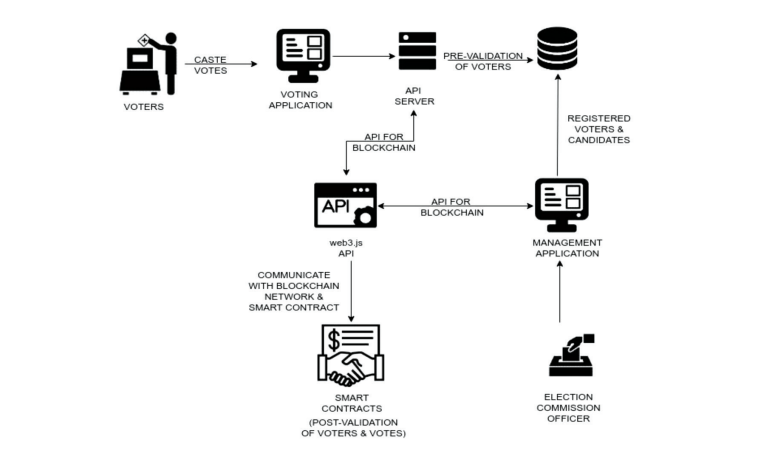
Smart contracts-based voting systems offer security, transparency, and immutability, making them more trustworthy and tamper-proof than traditional voting methods. In a decentralized network, the network nodes must confirm every transaction. After confirming and adding a vote to the blockchain, it becomes unalterable, providing a permanent and reliable record of voting results.
Smart contract platforms and other smart contracts blockchain-based voting systems offer the key benefits of both automation and accessibility, potentially increasing voter turnout. The decentralized nature of the blockchain ensures that the vote-counting process is transparent and tamper-proof. You can also vote using a smart contract application on a mobile device or computer from anywhere.
Smart contracts for ownership contracts.
If you have ever purchased a property, you know that ownership transfer is traditionally a relatively extensive process. And one almost always depends on a third party, at least if it is a house or an apartment. Furthermore, it can be challenging to obtain all the history of the object you buy, for example, to ensure that everything the seller reports is true.
According to smart contracts’ “If A, then B” logic, the ownership transfer will be simple. It will be as simple as “If the buyer transfers the money for the property, then the ownership will be transferred from the seller.” This process is automatic and confirmed on the public transaction ledger so everyone can see who owns the property.
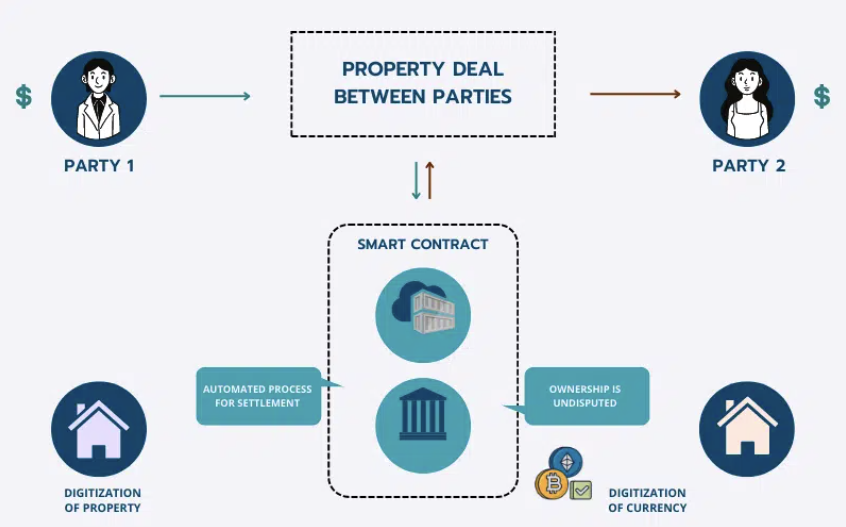
Additionally, integration can be created for historical transactions as part of such ownership contracts. This is particularly handy for an older property that has undergone multiple rounds of renovation. Then, all improvements will be included in the property or real estate’s history and documented in the transaction ledger.
Therefore, it becomes easy for you as a real estate buyer to get vital information, check the house’s history, and perform the purchase. When the software is designed according to applicable law, there will also be no need for a real estate agent or third party. This means cheaper and simpler property transfers and smoother buying and selling of homes. The same programming languages can, of course, also be used for other types of property contracts.
Smart contracts as administrative security.
Democracy is a demanding concept to maintain, especially within the corporate world—numerous examples of administrations that did not act by labor agreements and laws. In addition, it can be challenging to maintain a democratic organizational structure with just a few people in positions of power at the top.
Smart contracts can be used for various purposes in companies; the most obvious and perhaps important is ensuring fair governance. If financial flows and organizational decisions have to go through a smart contract, corruption would effectively become impossible in principle.
Furthermore, when two or more businesses collaborate, smart contracts can ensure efficient workflow and contract compliance. By digitizing the agreement and automating the sequence, you can avoid problems such as missed payments for services, misunderstandings of sub-agreements, or changes in progress.
Smart contracts in healthcare
Smart contracts can improve efficiency and speed up processes in the healthcare industry. Digitizing and automating administrative tasks can reduce bureaucracy and minimize errors, leading to faster treatment times and improved patient experiences. Smart contracts can also increase data privacy and security by using blockchain technology to store and manage sensitive health information.
With proper programming, you can use smart contracts in healthcare to streamline existing solutions, enhance efficiency in medicine delivery, facilitate information exchange, and improve insurance and cost calculations.
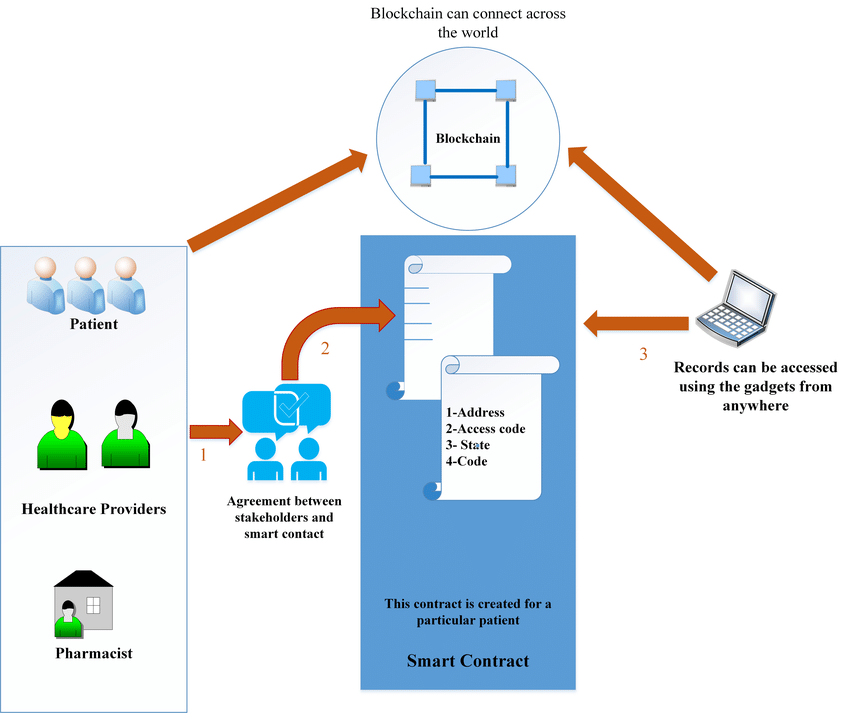
Smart contract technology in the healthcare system has the potential to streamline and optimize various processes, including medicine distribution, information exchange, and cost calculation, among others. However, to reap these benefits, you must establish a secure and reliable identity verification process to ensure that only authorized users can access sensitive information. Once this is in place, smart contracts can automate many manual processes and improve the efficiency of the healthcare system.
Smart contracts in healthcare can streamline processes and reduce administrative workload, allowing healthcare professionals to focus more on patient care. A well-implemented system could result in improved and more efficient services and decreased frustration for patients and healthcare workers.
Advantages of smart contracts
You have already seen several areas where smart contracts could have improved. Let’s take a look at the general benefits so you can better understand why smart contracts are so smart.
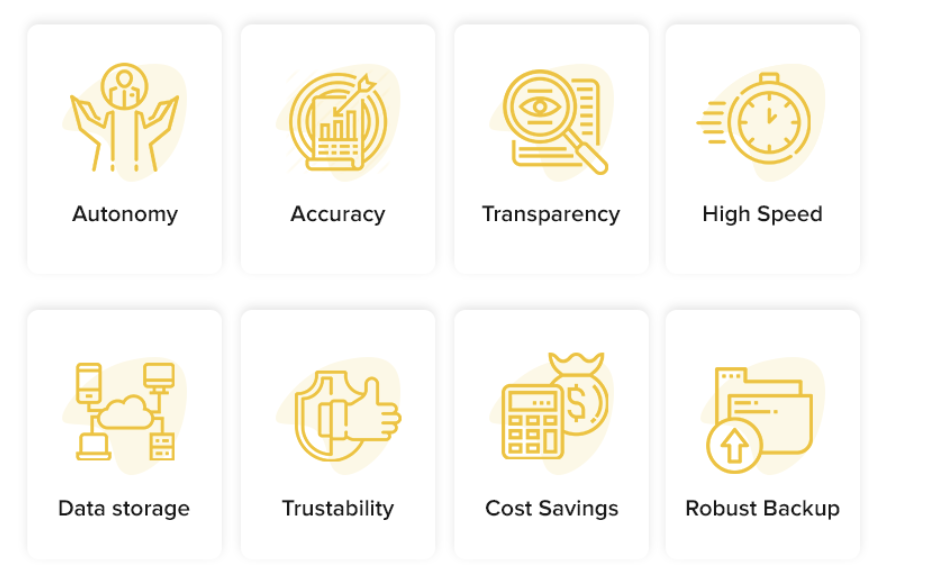
Self-governance without unnecessary intermediaries
Currently, contracts are typically executed through intermediaries. Whether you’re making a payment, purchasing medicine, or selling a house, this is true. In most cases, you’ll depend on a third party acting as the contract’s trust creator. The problem with these third parties is that they are intermediaries, and you must trust them.
A smart contract makes it possible to carry out transactions without these intermediaries—business to business, person to person, or person to business. You can create entirely watertight contracts and ensure that both parties abide by their side of the agreement without using a third party. The result is more efficient contracts, which also cost less money.
Smart contracts essentially create self-governance or autonomy. You and the other party can complete the contract exactly as it suits you. The contract guidelines are programmed into the smart contract; thus, no one can break it. If any disputes arise, the blockchain network can confirm the smart contract’s history.
Solid security, without the possibility of corruption
The blockchain network also creates solid security for smart contracts. Remember that the blockchain is a decentralized platform. Users confirming each transaction are located worldwide, and many must agree that the transaction is legitimate before approval.
Users obtain this functionality through the distributed ledger itself. Smart contracts connect to the distributed network using a ledger, which sequences them according to the agreement terms in the smart contract code. The smart contract functions run on the public ledger using ‘If A, then B’ logic. The nodes that confirm the different steps in the smart contract code will always check each new sequence component against the previous one.
It is said that a blockchain is impossible to hack. This is because a potential hacker would need to access every node in the network to carry out illegitimate transactions. Thanks to a solid, smart contract, integrating with the blockchain network eliminates the possibility of corruption or tampering with the data type or transactions.
100% trust in all transactions.
When so many independent users have to confirm a transaction to go through, it creates an enormous trust in everything that happens on the blockchain. This is ironic because the blockchain network is a trustless transaction system. You don’t need to trust a counterparty because the ledger and programming do this job.
Smart contracts create trust on both sides of the agreement for information transactions, such as transferring medical records, voting, or sensitive documents. The one who has voted in the political election knows that no one can tamper with their vote. Similarly, those counting the votes know it is impossible to forge them.
The ledger of any blockchain is public, and all transactions that have occurred can thus be verified. Once the network confirms smart contracts’ entire history and supply chain management, it becomes permanent and unchangeable.
Time savings without sloppiness.
Often, you have to choose one or the other. You have to do things thoroughly, which takes time – or you can do something quickly but with the risk of sloppiness. With a smart contract, you get the best of both worlds. Here, you can streamline several systems without fear that the system will become weaker.
As the voting and healthcare examples demonstrate, smart contracts can automate administrative and bureaucratic processes. This frees up more time for tasks we rely on competent people to perform.
With network confirmation and strong enough in programming languages, language, and cryptography, sloppiness is impossible. The program only runs the sequence according to the terms of the agreement, saving time and money without sacrificing quality.
The disadvantages of smart contracts
While smart contracts have many advantages, they are still a new technology that requires further improvements to work effectively on a large scale in practice.
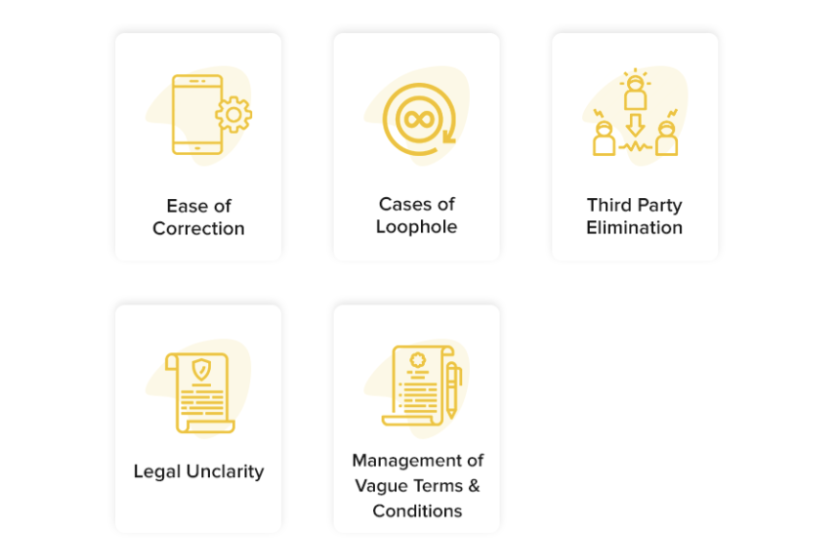
Smart contracts in existing, regulated systems
Smart contracts work in existing, regulated systems: The biggest challenge with how smart contracts work is how they will work in living systems with national regulations and laws. As mentioned, smart contracts make direct agreements possible. Since blockchain networks operate on a decentralized global scale, they remain entirely independent of varying national border regulations.
The biggest challenge with smart contracts is how they will work in existing systems, with national regulations and laws. As mentioned, smart contracts make direct agreements possible. And since blockchain networks are decentralized worldwide, this is entirely independent of national borders. This means that you can sell your services from Norway to a buyer in China – and complete the transaction in just a few minutes. How do you tax these transactions?
How will different governments keep track of them?
Where is the blockchain located when it is entirely a decentralized platform?
Additionally, smart contracts have legal challenges, such as which laws relevant parties to follow when programming to write smart contracts for beginners, how to handle breaches or disagreements between parties, and which courts will handle such disputes.
Generally, it isn’t easy to consolidate centralized and decentralized systems. We have already seen this with other financial institutions and, to a large extent, with cryptocurrency. Smart contracts encompass even more use cases and are slightly more challenging. For them to work, there will be a need for good cooperation between national laws and the international blockchain network.
Lousy programming and issues with smart contracts.
The weakest point in a smart contract is the person who programs the smart contract code. If there is an error in the coding, It will likely have significant consequences for all the transactions and parties to the agreement. The problem is that once a program has been launched on the blockchain, it is almost impossible to change it.
Coding errors are, therefore, another major challenge with smart contracts. It will be expensive to fix them; again, this becomes a question of responsibility. Who is responsible for contract errors if a human error in the smart contract’s design causes the issue? Moreover, how should the responsible party be held accountable for such human error?
In the business world, this is a significant concern. If we’re talking about agreements worth millions of dollars, you must be 100% sure that they go through as they should. Therefore, systems must be implemented to secure the full use of smart contracts and their programming before they are released live.
Anonymity on the blockchain and smart contracts.
At least initially, anonymity on the blockchain is one of the key points. The big crypto and blockchain enthusiasts rebelled against the centralized financial systems used today. Much of this is about escaping from a centralized database of sensitive personal information.
Additionally, the issue with anonymity in blockchain and other smart contract applications is that parties must be identifiable for the legal enforcement of contracts. If they remain anonymous the entire process, it becomes difficult to address issues if they arise.
For smart contracts to be practical, it’s vital to solve the anonymity problem effectively. A digital and automated smart contract example works fine, but maybe not if you don’t know who you’re writing it with.
Smart Contract Market and the Future of Smart Contracts
How does the smart contract market look today? And how will it develop in the future?
Who is working on smart contracts today?
Ethereum smart contracts are an obvious answer to this question. Thousands of decentralized applications on the Ethereum blockchain use smart contracts to do just that. More generally, we can say that both in cryptocurrency and blockchain technology in general, there is a significant investment in smart contracts.
But it’s not just in this groundbreaking field that smart contracts have gained a foothold. More and more companies are using smart contracts to run their solutions on the blockchain.
For example, the French airline AXA has created an application for immediate compensation for delayed flights. As soon as your flight is delayed by more than 2 hours, you will see options for compensation in your application.
Can smart contracts replace traditional agreements?
It appears that smart contracts are here to stay. More and more companies are testing the technology, and certain companies have entirely switched to solutions based on smart contracts. Nevertheless, there is still a way before smart contracts replace traditional agreements.
Part of this is about the disadvantages we have already seen. Addressing both the anonymity problem and the regulation of agreement terms are crucial challenges to overcome for implementing smart contracts on a large scale.
In addition to this, blockchain technology must also become more widely accepted. Most of the population will likely have trouble trusting a smart contract solution. Companies must also be willing to implement smart contract systems so consumers can use them.
Skepticism towards new systems is common, so smart contracts must address issues with incorrect coding and potential errors before fully replacing traditional contracts. Nevertheless, smart contracts are already underway, and we will likely see more and more use of them soon.
Summary
Smart contracts are a new technology that can revolutionize how we conduct business agreements. They eliminate the need for intermediaries and increase efficiency by automating processes. Smart contracts offer secure transactions by connecting to a decentralized blockchain network, which is nearly impossible to hack.
There is a high level of trust in all transactions, as many independent users must confirm each transaction before it goes through.
However, there are also disadvantages to smart contracts, such as legal challenges, coding errors, and anonymity on the blockchain. Numerous companies are already utilizing smart contracts, and with the ability to overcome challenges, they can replace traditional agreements.
First, learn a language for smart contracts, like Solidity. It's popular with Ethereum. Set up a place to work and learn Solidity basics. Then, you can start writing your own code.
Yes, a beginner can learn Solidity. It's not too hard if you've done other programming languages before. There are many resources like courses, tutorials, and guides. Join online groups to ask questions and get help.
Yes, you can make your own. No one needs to say it's okay. Ensure you know the programming language and blockchain well so it works correctly.
Think of a vending machine. It takes money and gives items. Smart contracts work like that too. They do things automatically when certain things happen. Like giving money to a seller when a buyer gets their stuff.












